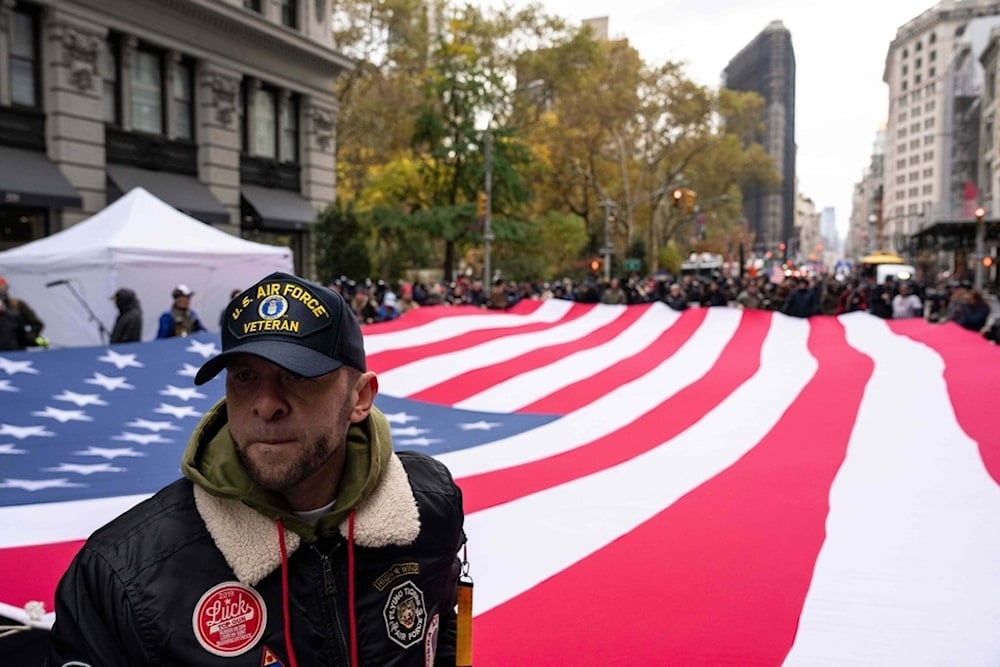Only 29% of US citizens support Trump attacks in Caribbean: Poll
A new poll shows only one in three Americans support the US military's lethal anti-drug strikes as Washington escalates operations in the Caribbean and weighs broader action against Venezuela.
-

A U.S. Air Force veteran holds an American flag during the Veterans Day parade, Tuesday, Nov. 11, 2025, in New York (AP Photo/Yuki Iwamura)
Fewer than one in three Americans believe the US military should carry out lethal strikes against people accused of trafficking drugs in the Caribbean or the eastern Pacific, according to findings from a Reuters/Ipsos survey released on Friday.
The poll shows that 29% of respondents support the practice, while a slight majority, 51%, say they oppose it outright. The remainder reported uncertainty.
Sharp political divide
The issue reveals a significant partisan gap. Among Republicans, 58% expressed approval, with only 27% rejecting the idea and the rest undecided. Democrats, however, voiced strong resistance: close to three-quarters said they object to such operations, and roughly one in ten voiced support.
The online poll was conducted nationwide between November 7 and 12, gathering responses from 1,200 US adults. The margin of error is three percentage points.
Escalating US operations in the region
The survey comes as Washington intensifies its maritime and aerial presence around the Caribbean. In recent months, the Pentagon has expanded its deployment of ships, aircraft, and personnel as part of what US officials claim to be an effort to curb drug trafficking and terrorism.
Since early September, President Donald Trump has approved a series of strikes against vessels Washington labels as drug-running operations in the Caribbean and the Eastern Pacific. By November, these attacks had destroyed dozens of boats and resulted in more than 75 deaths, according to US reports.
On Tuesday, the USS Gerald Ford entered the US Southern Command region, adding to the growing military concentration linked to the strike campaign.
The escalation now unfolds alongside the launch of Operation Southern Spear, a new regional campaign unveiled this week that expands the use of robotic interceptor boats, long-endurance maritime drones, and vertical take-off robotic aircraft. The operation is part of a broader set of military options presented to President Trump, who is reportedly weighing scenarios that include strikes inside Venezuela and potential action against President Nicolas Maduro’s government.
A Washington Post investigation also revealed that the US Justice Department’s Office of Legal Counsel issued a classified opinion in July granting legal cover to US personnel carrying out these lethal maritime strikes. The review was requested after senior Pentagon lawyers warned that the operations could trigger legal and political consequences. Admiral Alvin Holsey, who headed US Southern Command, reportedly urged caution and unexpectedly resigned in October, with sources linking his departure to concerns over the expanding campaign.
Regional reaction and covert activities
Venezuela has responded by launching a large-scale defensive exercise known as "Plan Independencia 200", deploying around 200,000 troops, along with aircraft and naval units, in reaction to the expanding US presence. The forces have since been folded into a new nationwide defense command that unifies the country’s military, police, and civilian structures to protect strategic infrastructure amid mounting tensions.
Separately, an October report by The New York Times revealed that the Trump administration had quietly granted the CIA authority to conduct covert actions inside Venezuela, including lethal strikes, as part of a broader effort aimed at undermining President Nicolas Maduro and his government.
Read more: Venezuela activates national defense system

 3 Min Read
3 Min Read








